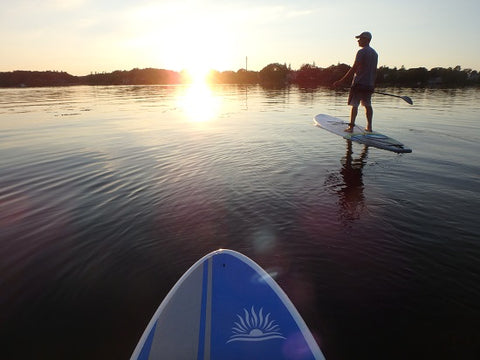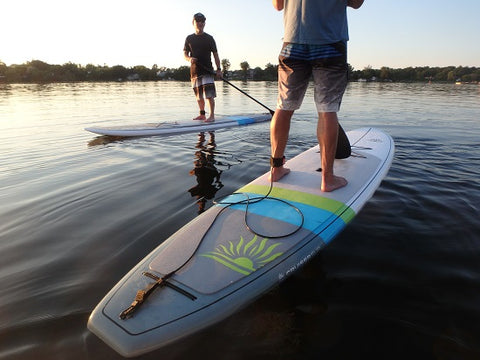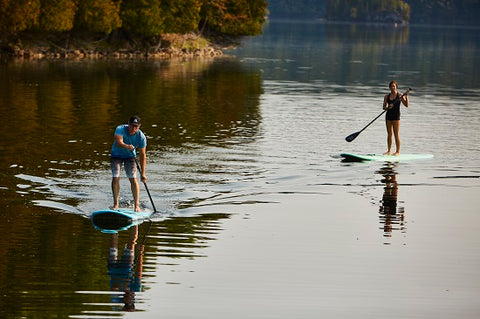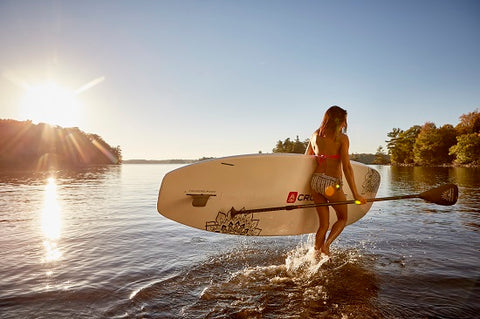With the right sized equipment and the right conditions, stand up paddle board beginners will find SUP a quick and fun sport to learn. With these tips, you can make it even easier to take your SUP skills from zero to hero!
Start in Calm Water
When you first start to stand up paddle board, getting used to how the board feels underfoot is key. Picture trying to learn how to walk during and earthquake. That is what tying to learn to stand up paddle board in rough or choppy waters will feel like. If the water is flat and calm, you can focus on your stance, positioning on the board, balance, and starting to paddle. Rougher waters add an element of challenge that you will find exciting down the road, but to start, aim for calm waters
Pro Tip – Check the wind forecast. Wind makes waves, to the lighter the wind, the smaller the waves will be. Sheltered and protected bays are a great spot for your first outing. If you are seeing whitecaps on the water, wait until it calms down.
Wear a Leash
Leashes save lives. A leash is a length of cord that attaches to the tail of your board, and then to your ankle. On your first few times out on a SUP, you may find that you take a spill and find yourself in the water. With a leash on your, your board can not get a further distance away from you than the length of the leashes. Rough waters, wind, and current can sweep your board away from you very quickly and can make it hard to get back to. With your leash on, a quick tug on the leash and your board is right back in front of you.
Pro Tip - Wear one. There is a misconception that leashes are only needed for surfing. A board can get away from you very quickly in flat water, and you can quickly tire trying to swim after it. In rougher waters, once a board is about 20 feet away from you, regardless of how strong of a swimmer you are, you will not be able to chase it down. You will tire out chasing it, the waves will not tire our of pushing it further from you.

Look Up
Where your eyes look, your body will likely follow. Remember taking driver lessons and learning how to shoulder check? Remember your instructor correcting you for swerving the car when you turned your head? Generally where you look with your eyes, your body is going to follow. When learning to stand up paddle board, often the tendency is to look down at your feet. Doing so will likely result in you going for a swim sooner than later. Instead, keep your head up and let your eyes gaze toward the horizon. Not only will that keep you dry, but you will find it will increase your paddling efficiently as your body position will be more comfortable.
Pro Tip - Look where you want to go. See a spot on the shore line that you want to go towards? Look at it as you paddle towards it!

Use The Right Size Board and Paddle
SUP success will come much faster if you are on the right sized board and paddle.
Your paddle should be somewhere between 6" to 10" over your head. It is best to start with an adjustable paddle so that you can experiment with the length paddle you want to use.
If you are on a board that is too small, you will find it will feel tippy and unstable. The easiest way to look at board sizing is by considering the boards volume or flotation. Aim for a board that has at least the same amount of volume as your weight . In learning to SUP, more volume will mean it will just feel more stable. You can never me on too large of board to learn, but you can certainly be on a board that is too small. If you are 150lbs, aim for a board that has at least 150L of volume or more!
Pro Tip - When in doubt, go bigger. If you weight is more than about pounds over your boards volume, it will start to feel tippy. But, if your weight is 30 pounds under your boards volume, it will feel super stable!

Master the Basics
Learn to crawl before you walk, so to speak. Learning to stand up, mastering the basic forward stroke, and learning how to turn around are the fundamentals skills of stand up paddle boarding. After you master these, you can start to progress towards paddling further, faster, in rougher waters, or in surf. Spend the time to make sure you are extremely comfortable paddling in calm waters before venturing to more challenging conditions.
Pro Tip - Focus on slow progression. Rome wasn't built in a day, and neither were your SUP skills. Heading out into the surf after your first 15 minutes on a board is likely not in your best interest. Not only will it be dangerous for you, but potential dangerous for those around you as well.

Use These Tips for Stand Up Paddle Boarding Beginners To Make Learning Easy
Make things as easy and safe for yourself when learning how to SUP. Follow these tips to help experience as a beginner stand up paddle board as fun and successful as possible!
What was the best tip you received when learning to stand up paddle board? Comment below or email us at info@cruisersup.com.


